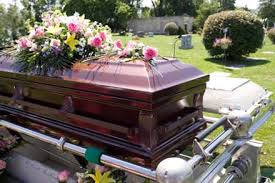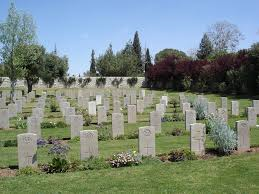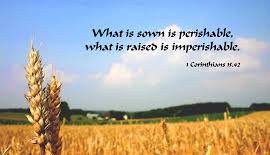The Resurrection Body
The subject of the resurrection body has sparked a lot of interest among Christians. This is evidenced by the frequency of articles published in Christian periodicals and newspapers pertaining to this subject.
But it’s really not a very confusing issue at all, if we are simply willing to hear what the bible says, and believe what it says. Many times writers will quote verses of scripture on the subject, but then when they attempt to further explain what those verses say, their own words contradict the very words of the verses that they just quoted.
So evidently this is a subject that people want to talk about, and one that they want to know the truth about. It simply “matters” to people. They want to know the answer.
Here’s An Example
 Let me use a question and answer from a Christian publication to illustrate this point..
Let me use a question and answer from a Christian publication to illustrate this point..
The question at the top of the article is; Will the body of a loved one, placed in the grave, be the body that will also be raised?
The simple answer, according to the bible, is No. The body that is placed in the grave, is NOT the same body that will be raised. Here are the verses that very directly, and very specifically answer the question..
1 Cor 15:37, “And that which you sow, you do NOT sow the body which is to be..” So then we can see, it’s not the same body.
1 cor 15:42, “It is sown a perishable body, it is RAISED an imperishable body.” Again, not the same body.
1 Cor 15:44, “It is sown a natural boy, it is RAISED a spiritual body.” And once again, not the same body. One type of body was sown, and different type is raised.
Now let me humbly point out the contradiction in the article that I’m referencing, when the author tries to put this into his own words. These are his words from his article..
“Paul wrote in great length to the Corinthians about the resurrection. He tells us we will have the SAME body, but that body will be completely different. As paradoxical as that sounds, the resurrection body will be CHANGED by God into an eternal form.”
Now there are actually two contradictions there, compared to the actual words of the bible.
First; Listen once again to V-37, “And that which you sow, you do NOT sow the body which is to be.”
The writer claims that the apostle Paul said; We will have the SAME body, but what Paul actually said was this.. “And that which you sow, you do NOT sow the body which will be.” So clearly it will NOT be the same body. You see the obvious contradiction there, don’t you?
Secondly; the writer of the article said: The resurrection body will be changed, but God says; “it will be RAISED a spiritual body”. So then, the body that is raised, will not be changed at all. The body that is raised will BE the spiritual body that remains. V-42 says, “It is sown a perishable body, it is RAISED an imperishable body”. The imperishable body that we will be raised with, will NOT change. The change will have already taken place, from natural to spiritual, and from perishable to imperishable.
V-51 confirms, “We shall not all sleep (in other words, some people will remain alive at the coming of the Lord) but we will all be changed”. What we need to understand is that, for those who have “fallen asleep”, the change occurs at the time of the resurrection. That’s when we will “be clothed” in our spiritual body. (2 Cor 5:4) We will be RAISED with an imperishable, spiritual body. But the change for those who remain alive, will occur when “we are caught up to meet them in the air”, as we read in 1 Thess 4:17.
The Bible Uses Some Figurative Language
 The verses form John 5:28-29, that the writer of the article begins with, have some figurative wording in them. Specifically, the phrase, “all that are in the tombs”, is a figurative phrase. Here’s how we can know that it must be figurative..
The verses form John 5:28-29, that the writer of the article begins with, have some figurative wording in them. Specifically, the phrase, “all that are in the tombs”, is a figurative phrase. Here’s how we can know that it must be figurative..
We know from all those verses in 1 Cor. chapter 15, that it’s a spiritual body that will be raised, and not the old physical body. That old body will have already been changed into the imperishable body which is raised. Therefore, the phrase “all that are in the tombs”, cannot refer to the actual physical body that lies in a tomb, but rather, it is figurative wording, that refers to “all who have died”.
If the apostle John were literally saying that physical bodies would come forth from the graves, unto a resurrection of life, he would be directly contradicting all those verses in 1 Corinthians, that we looked at, and also V-50 which says; “Flesh and blood CANNOT inherit the kingdom of God, nor does the perishable inherit the imperishable.”
Therefore a physical body CANNOT come forth to a resurrection of life or death. Only a spirit can come forth to a resurrection of life or death.
So then, when John wrote; “An hour is coming in which “all who are in the tombs”, will hear His voice and come forth, those who did good deeds, to a resurrection of life, and those who did evil deeds, to a resurrection of judgment”, he obviously was not referring to literal flesh and blood bodies coming forth, but rather he was simply referring to the fact that the spirits of everyone who has ever died, will come forth (in their spiritual bodies), some to a resurrection of life, and others to a resurrection of judgment.
Remember, “that which you sow, you do NOT sow the body which is to be”. 1 Cor 15:37
I hope that this makes it all a little bit clearer, for those of you who are interested in the resurrection body.
And my prayer is that we will all study the word of God, and believe exactly what it says. God’s words can be very comforting, if we will just believe them.
May God bless you in the study of His word.
As always, I encourage you to leave any comments or questions, in the area provided below.


Hi Jim.
This was a very interesting post. It made me think. I have always preached that we will receive a new body, as you said. And I still hold to that; but I can understand the other point of view somewhat. There is this verse that seems to lean toward that interpretation.
Philippians 3:21 – who will transform the body of our humble state into conformity with the body of His glory, by the exertion of the power that He has even to subject all things to Himself.
Maybe the two interpretations aren’t so far apart as they seem?
Although the seed is very different than the plant it grows into; a tomato seed will not grow a pepper plant; but will only grow a tomato plant. So could it be said that although the body will be very different (corruptible to incorruptible) it must come from the same seed (which could mean our earthly body)?
I never thought about this before in this way; so you got me thinking. I certainly agree that the body that will be raised will not be our earthly body; but our new spiritual body that is incorruptible.
Thanks for giving me something to think about. I will be happy to hear what you think about the seed and the plants. Lol.
Jeannie
Hi Jeannie, it’s great to hear from you again! Your thought about the new body coming from the “seed” of the original physical body is an interesting twist. But I really don’t think that could be the case. The reason I don’t think so is, that I think the bible is clear that physical things are completely different in nature from spiritual things. The difference between the perishable and the imperishable is the perfect example of that. Therefore I don’t believe that anything still related to our fleshly body, such as a “seed” so to speak, can have any part in the new spiritual body. I believe that Phil 3:21 is simply stating that our physical body will be changed into a spiritual body, just like it says in 1 Cor 15:51. I looked up the word “transformed” from Phil 3:21. The original Greek word means to “change the appearance of”. Meaning that our new body will be just like Christ’s body, in it’s “appearance”, even though we have no idea what the “appearance” of a spiritual body is. But it is clear that it will be “conformed” to the likeness of Christ’s spiritual body. There can be nothing at all left of the flesh and blood body, because 1 Cor 15:50 is clear that “flesh and blood cannot inherit the kingdom of God”. So the verse is not at all talking about any “transformation” of the physical body, but rather it’s simply saying that our new body will be conformed to Christ’s body.
I do appreciate your thought on this matter though. I hope my reply made sense to you. Please let me know what you think. May God bless you Jeannie. And again, please do reply back to me on this.